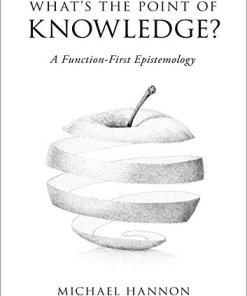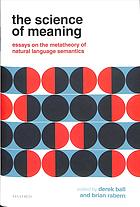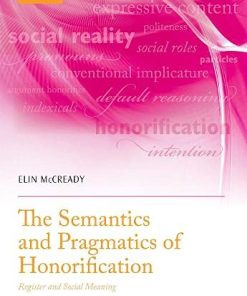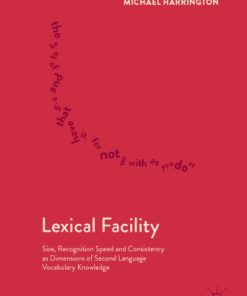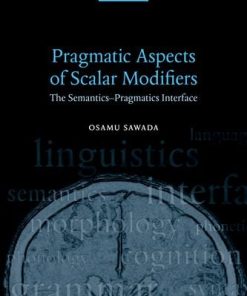(Ebook PDF) The Semantics of Knowledge Attributions 1st edition by Michael Blome Tillmann 0192677527 9780192677525 full chapters
$50.00 Original price was: $50.00.$25.00Current price is: $25.00.
The Semantics of Knowledge Attributions 1st edition by Michael Blome-Tillmann – Ebook PDF Instant Download/DeliveryISBN: 0192677527, 9780192677525
Full download The Semantics of Knowledge Attributions 1st edition after payment.

Product details:
ISBN-10 : 0192677527
ISBN-13 : 9780192677525
Author : Michael Blome-Tillmann
In this book, Michael Blome-Tillmann offers a critical overview of the current debate on the semantics of knowledge attributions. The book is divided into five parts. Part 1 introduces the reader to the literature on ‘knowledge’ attributions by outlining the historical roots of the debate and providing an in-depth discussion of epistemic contextualism. After examining the advantages and disadvantages of the view, Part 2 offers a detailed investigation of epistemic impurism (or pragmatic encroachment views), while Part 3 is devoted to a careful examination of epistemic relativism and Part 4 to two different types of strict invariantism (psychological and pragmatic). The final part of the book explores Presuppositional Epistemic Contextualism – a version of contextualism that is argued to provide a more powerful and elegant account of the semantics of ‘knowledge’ attributions than many of its competitors. A clear and precise account is provided of the main principles underlying each view and of how they aim to explain the pertinent data and resolve philosophical puzzles and challenges. The book also provides charts outlining the relations between the positions discussed and offers suggestions for further reading.
The Semantics of Knowledge Attributions 1st Table of contents:
Part I: Epistemic Contextualism
1. Epistemic Contextualism
1.1 What is Epistemic Contextualism?
1.2 Evidence for Contextualism
1.3 Sceptical Puzzles
1.4 Error Theory and Contextual Shifts
1.5 Closure
1.6 The History of Contextualism
1.7 Suggestions for Further Reading
2. Semantic Implementations
2.1 Indexicality: Character and Content
2.2 Classical Contextualism
2.3 Radical Contextualism
2.4 Fancy Contextualism
2.5 The Varieties of Epistemic Contextualism
2.6 Suggestions for Further Reading
3. Versions of Contextualism
3.1 The Character of ‘Knowledge’
3.2 David Lewis: Relevant Alternatives
3.3 Stewart Cohen: Internalist Evidentialism
3.4 Keith DeRose: Safety and Sensitivity
3.5 Further Views
3.6 Suggestions for Further Reading
4. Linguistic Objections
4.1 Semantic Blindness
4.2 Syntactic Gradability
4.3 Overt Restrictors
4.4 Free Shifting
4.5 A Linguistic Scorecard
4.6 Suggestions for Further Reading
5. Philosophical Objections
5.1 Over-generation
5.2 Too Much of a Concession?
5.3 Misconstruing the Sceptic?
5.4 Knowledge Norms
5.5 Surveys and Experimental Philosophy
5.6 Suggestions for Further Reading
A Wish List for Contextualists
Part II: Epistemic Impurism
6. Epistemic Impurism
6.1 What is Epistemic Impurism?
6.2 Evidence for Impurism
6.3 Relation to Contextualism_ Impurist Contextualism?
6.4 Evaluating the Arguments from Principles
6.5 Suggestions for Further Reading
7. Problems and Objections
7.1 Counterexamples to the Knowledge-Action Principles
7.2 High-Attributor/Low-Subject Stakes
7.3 Are there Practical Factor Effects?
7.4 Unpleasant Consequences: Embeddings
7.5 Further Objections
7.6 Concluding Remarks
7.7 Suggestions for Further Reading
Part III: Epistemic Relativism
8. Epistemic Relativism
8.1 Truth-Relativism about ‘Knowledge’-Attributions
8.2 Motivation
8.3 Objections and Replies
8.4 Conclusion
8.5 Suggestions for Further Reading
Part IV: Strict Invariantism
9. Psychological Invariantism
9.1 Lack of Belief
9.2 The Availability Heuristic
9.3 Epistemic Egocentrism and Epistemic Anxiety
9.4 Epistemic Focal Bias
9.5 Fragility and Over-generalization
9.6 Suggestions for Further Reading
10. Pragmatic Invariantism
10.1 Sceptical Pragmatic Invariantism
10.2 Moderate Pragmatic Invariantism
10.3 A Map of Positions
10.4 Suggestions for Further Reading
Part V: Presuppositional Epistemic Contextualism
11. The Presupposition Effect
11.1 The Insufficiency of Salience
11.2 Concrete and Vivid Salience
11.3 The Presupposition Effect
11.4 The Indirect Relevance of Stakes and Salience
11.5 Charity, Accommodation, and the Deferral Effect
11.6 Concessive Knowledge Attributions
11.7 Concluding Remarks
11.8 Suggestions for Further Reading
12. Presuppositional Epistemic Contextualism
12.1 From Attention to Presupposition
12.2 Presuppositional Epistemic Contextualism
12.3 Philosophical Objections: PEC and Non-Elusiveness
12.4 Linguistic Objections: Automaticity, Blindness, and Clarifiability
12.5 Suggestions for Further Reading
People also search for The Semantics of Knowledge Attributions 1st:
what is semantic understanding
what is the nature of knowledge
the semantics of biblical language
semantic knowledge definition
knowledge of semantics
Tags:
The Semantics,Knowledge Attributions,Michael Blome Tillmann
You may also like…
Politics & Philosophy
What’s the Point of Knowledge?: A Function-First Epistemology 1st Edition Michael Hannon
dictionaries & phrasebooks
dictionaries & phrasebooks
Politics & Philosophy
Politics & Philosophy - Anthropology
The Semantics and Pragmatics of Honorification: Register and Social Meaning 1st Edition
Technique - Food Manufacturing
dictionaries & phrasebooks
Politics & Philosophy - Anthropology
Pragmatic Aspects of Scalar Modifiers: The Semantics-Pragmatics Interface 1st Edition Osamu Sawada
Politics & Philosophy




